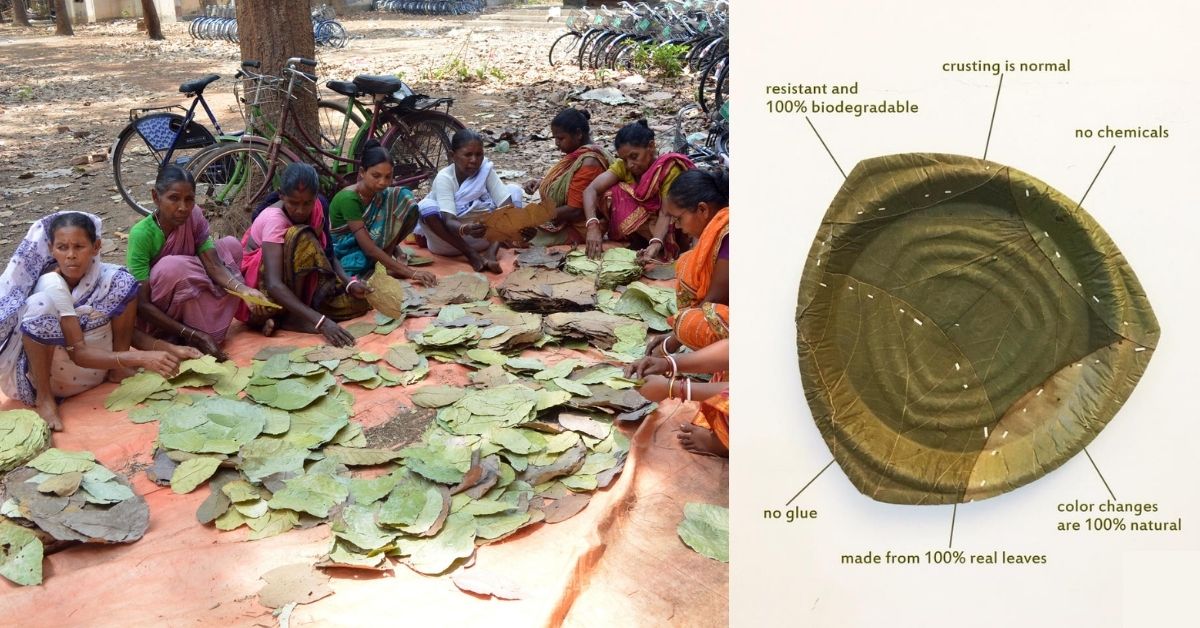I n India, it’s not just about what you eat but how you eat as well. For instance, a gulp of the world-famous flavour bomb phuchka, aka pani-puri, is never quite satisfying in a plastic or steel bowl as it is in the traditional ‘sal pata’ bowl.
Called by a variety of names like patravali, pattal or vistar, etc. the practice of eating in a plate or bowl made out of leaves is a very common practice in India. A centuries-old tradition, this holds roots in the Sutrasthana, the first chapter of Charaka Samhita, the oldest treatise on Ayurveda by Acharya Charaka. According to Acharya Charaka, who was a principal contributor in Ayurveda, the practice of eating on a leaf plate with hands encourages sparsh (touch), which is responsible for awakening all the sensory organs in the mind, making the food consumption experience truly wholesome.
From community feasts, weddings, funerals to roadside snack shops, these crinkled dried-leaf plates and bowls are everywhere, every day and are intrinsically a part of Indian culture.
So, it’s quite a shocker when a German company, Leaf Republic, launched its ‘innovative’ collection of tableware made out of leaves. A perfect example of old wine in a new bottle, this curious case of Leaf Republic has sent Indian Twitterati down a rabbit-hole of traditional and indigenous products that the West borrowed, without credit, and rebranded as ‘innovative’ and path-breaking.
Phew.🙄🙄🙄 Come to India and visit temples. Ull get this donnai. What have u exactly invented ? We have been using leaf plates for centuries. pic.twitter.com/SDcb0BYvW1
— krithika sivaswamy (@krithikasivasw) February 23, 2019
After the Indian-styled toilet became ‘Squatty Potty’ and the humble haldi doodh’s makeover into chai-tea latte, this looks like another case of colonisation of indigenous products.
Leaf Republic’s motto—“Because we spend only a brief moment on this world”—could be a cryptic justification for the cultural amnesia these companies suffer from. Their brief existence might have fueled such conveniently ignorant innovations that are precariously balancing on the borders of cultural appropriation, but there’s more to it than that.
It’s not just a case of plagiarised ‘innovation’ that is being sold at a whopping price of £8.50 per plate (Rs 873), but the irony it reflects. Leaf utensils have for decades fueled the cottage industries in India and several Asian countries. These cottage industries were revitalised during India’s freedom struggle in an effort to economically beat the colonizers. Now their products, rebranded by the German company as ‘innovative’ and ‘one-of-a-kind’ are turning it all upside down.

Presented with admirable sophistication, Leaf Republic offers a range of leaf tableware which includes bowls, plates and trays. These are made up of four layers — two layers of leaves stitched together with palm fibres, a waterproof leaf-based paper layer in the middle and a bioplastic lid on top. With their completely automated production process, they pride themselves in being completely organic, free from any trace of plastic, oil, glue or chemicals.
While we appreciate the West finally embracing more eco-friendly products like these in their daily lives, it would have been better if the plagiarism was avoided to give way to more empowerment, like it was done by Hyderabad-based startup, Vistaraku.
The startup, founded by Venugopal and Madhavi Vippulancha in 2019, makes similar leaf utensils. The good folks at Vistaraku have not only given credit where it’s due but also ensured its business helps cottage industries in Telangana and Andhra Pradesh thrive. Thanks to them, hundreds of rural women now have a livelihood and financial independence. Now that’s how it’s done!
(Edited by Yoshita Rao)
No comments:
Post a Comment